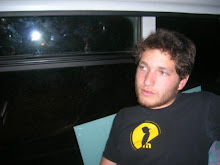Beautiful passage from Brenner's novella, "Nerves," when the storyteller first sets eyes on the port of Jaffa in Turkish era Palestine:
"And I was forced to acknowledge once again that ancient truth that even though one 'knows' that all things are equally unimportant and ultimately even the same, one cannot, as long as one lives and breathes, ignore the differences between one man and another, one man and another, one place and another, one life and another, and one human condition and another...and that despite my intellectual awareness, I could not help feeling different emotions at different times that might be worlds apart from each other, that might sometimes be of the simplest, most humanly universal variety, and at others of the most mysteriously bizarre...because I tell you, there are mysterious combinations of circumstances in this life, my friend..."
My take:
Yosef Chaim Brenner’s 1910 novella, “Nerves,” is a reflection on his anxious excitement over the Zionist project. The reader sees that Brenner, through the eyes of the storyteller, has traveled through many diasporic lands—Ukraine, New York, London, Berlin, and Cairo, with the hopes “of finding a foothold, any hold” (p.37) in the world. However, the storyteller knows that his circumstances will never allow for him to find such a hold in the diaspora and thus yearns “for a place to call my own, which as a Jew was something I had never had” (p.37). “Nerves” is a classic conflict between head and heart: on the one hand Brenner’s intellect tells him that in the greater scheme of things, on the meta level of the existentialist, there is no such thing as a Jewish homeland—“what on earth do we and the land of Judea really have to do with each other?” (p.51)
At the same time, when Brenner’s character allows his emotions to take over, he confesses that there is something special about the Biblical homeland. As the opening passage confirms, he cannot help himself. Try as he might to deny that special connection, when he sees the Haifa shores for the first time he really does “believe in the beauty of nature…of the cosmos…of something even higher than that” (p.57). That he attempts to diminish this feeling by attributing it to his nerves shows only that his rational side is responding back due to his harsh reality as a pioneer. It is this nervous angst that causes Brenner to splice comments like those about the “bird whose Hebrew name” (p.32) was not yet known throughout the novella. They reflect the same struggle of storyteller: can the Jewish sufferer’s eternal wandering actually end with settlement in Israel? Although life in the Orient is by no means easy, the answer, of course, is unequivocally yes.
Monday, October 25, 2010
Subscribe to:
Post Comments (Atom)

Dear Jonah,
ReplyDeleteI picked up your Columbia "Spectator" piece on Ben-Gurion University's Facebook page and Twitter accounts. Thanks for your support. Great article.
Personally, I also picked it up on my own page, The New Jew: Microblog on Facebook (http://tinyurl.com/TheNewJew), where I welcome your participation.
Yishar Koach,
~ Maya Norton
Dept of Donor & Associates Affairs, BGU
http://tinyurl.com/BGUonFB
http://twitter.com/BenGurionU
Reference link: http://www.columbiaspectator.com/2010/10/17/find-diversity-here
This is exactly what I need for my JTS Literature short paper...thanks Jonah!
ReplyDelete